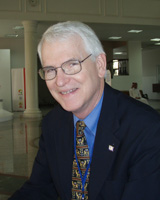 |
Douglas Boyd of the University of Kentucky. |
Cox Center Research Team Examines U.S. Public Opinion On Controversy Involving United Arab Emirates Port Company
While the media almost certainly played a role in informing the U.S. public about the controversy over the proposed purchase by Dubai Ports World of a British company that operated six U.S. ports in 2006, how members of the public interpreted the facts they received from the media was greatly influenced by their prior attitudes.
That is a key finding of research conducted by researchers at the James M. Cox Jr. Center for International Mass Communication Training and Research at the University of Georgia and presented at a conference at the University of Sharjah in the United Arab Emirates in December of 2007. Both Dubai and Sharjah are part of the U.A.E.
Dr. Lee B. Becker, director of the Cox Center, had been invited to the conference to present his research on U.S. public opinion about the DP World purchase. Researchers from the Arab world were joined by scholars from Australia, Canada, Germany, Norway, the United Kingdom and the United States at the two-day conference held December 11 and 12.
The research presented by Dr. Becker showed that, based on a number of public opinion polls conducted at the time, the purchase of the British company by the company based in the United Arab Emirates was opposed by a large majority of the U.S. population.
Dr. Ayman Nada from the University of Cairo in Egypt collaborated with Dr. Becker on the research. Dr Nada spent six months as a visiting scholar in the Cox Center in the first half of 2007.
The team was interested in ports controversy as a way of understanding the image of the United Arab Emirates in the United States.
In early 2006, Dubai Ports World purchased London-based Peninsular and Oriental Steam Navigation Company. The purchase would have given DP World, owned by the government of U.A.E., control over commercial port operations in New York, New Jersey, Baltimore, New Orleans, Miami and Philadelphia.
For several months, the issue played out in the U.S. media, with the 24-hour cable and satellite channels giving it a great deal of attention. With this backdrop, the U.S. Congress, over the objection of the Bush administration, thwarted the takeover of operation of the U.S. seaports by DP World. The U.A.E. company ultimately divested itself of the port operation contract.
Analysis of archived public opinion polls by Drs. Becker and Nada showed that exposure to the stories in the mass media led to both increased support for the DP World purchase and increased opposition. The nature of the effect was largely determined by partisan attitudes.
Among Democrats, Drs. Becker and Nada found, those who followed the story most closely in the media were more likely to be opposed to the purchase. Among Republicans, on the other hand, following the story showed no relationship with support or opposition to the purchase.
The research showed that Republicans, Independents and Democrats were equally likely to learn details about the DP World purchase from the media, but what they did with the information was largely shaped by partisan attitudes.
Republicans high in knowledge were more likely to support the purchase, while the attitudes of Democrats was unaffected by the knowledge.
The conference in Sharjah was organized by the College of Communication at the University of Sharjah and held on the campus of the University. The theme of the conference was Satellite Television and Cultural Identity.
Approximately 120 scholars and students attended.
The Cox Center, directed by Dr. Becker, is a unit of the Grady College of Journalism and Mass Communication at the University of Georgia.
- Paper presented by Drs. Becker and Nada.
- PowerPoint presentation given by Dr. Becker at the conference.

